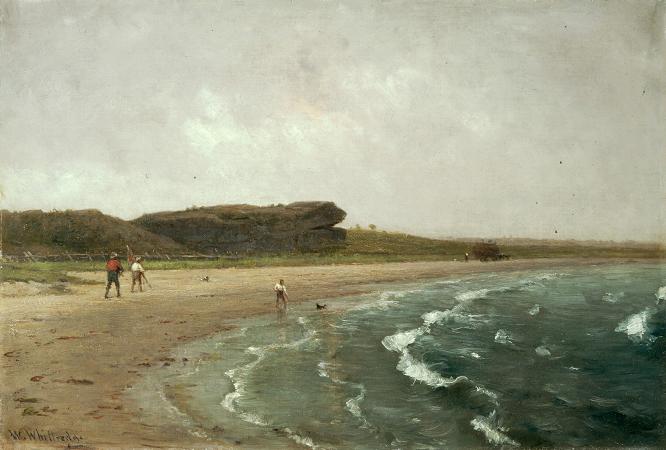Newport. Newport is a seaside city on Aquidneck Island in Newport County, Rhode Island, located approximately 33 miles southeast of Providence, Rhode Island, 20 miles south of Fall River, Massachusetts, 73 miles south of Boston, and 180 miles northeast of New York City. It is known as a New England summer resort and is famous for its historic mansions and its rich sailing history. It was the location of the first U.S. Open tournaments in both tennis and golf, as well as every challenge to the America's Cup between 1930 and 1983. It is also the home of Salve Regina University and Naval Station Newport, which houses the United States Naval War College, the Naval Undersea Warfare Center, and an important Navy training center. It was a major 18th-century port city and also contains a high number of buildings from the Colonial era. The city is the county seat of Newport County, which has no governmental functions other than court administrative and sheriff corrections boundaries. It was known for being the location of the Summer White Houses during the administrations of Presidents Dwight D. Eisenhower and John F. Kennedy. The population was 24,672 as of 2010. Newport was founded in 1639 on Aquidneck Island, which was called Rhode Island at the time. Its eight founders and first officers were Nicholas Easton, William Coddington, John Clarke, John Coggeshall, William Brenton, Jeremy Clark, Thomas Hazard, and Henry Bull. Many of these people had been part of the settlement at Portsmouth, along with Anne Hutchinson and her followers. They separated within a year of that settlement, however, and Coddington and others began the settlement of Newport on the southern side of the island. Newport grew to be the largest of the four original settlements which became the Colony of Rhode Island and Providence Plantations, which also included Providence Plantations and Shawomett. Many of the first colonists in Newport became Baptists, and the second Baptist congregation in Rhode Island was formed in 1640 under the leadership of John Clarke. In 1658, a group of Jews were welcomed to settle in Newport; they were fleeing the Inquisition in Spain and Portugal but had not been permitted to settle elsewhere. The Newport congregation is now referred to as Congregation Jeshuat Israel and is the second-oldest Jewish congregation in the United States. It meets in Touro Synagogue, the oldest synagogue in the United States. The Colony of Rhode Island and Providence Plantations received its royal charter in 1663, and Benedict Arnold was elected as its first governor at Newport. The Old Colony House served as a seat of Rhode Island's government upon its completion in 1741 at the head of Washington Square, until the current Rhode Island State House in Providence was completed in 1904 and Providence became the state's sole capital city. Newport became the most important port in colonial Rhode Island, and a public school was established in 1640. The commercial activity which raised Newport to its fame as a rich port was begun by a second wave of Portuguese Jews who settled there around the middle of the 18th century. They had been practicing Judaism in secret for 300 years in Portugal, and they were attracted to Rhode Island because of the freedom of worship there. They brought with them commercial experience and connections, capital, and a spirit of enterprise. Most prominent among those were Jacob Rodrigues Rivera, who arrived in 1745 and Aaron Lopez, who came in 1752. Rivera introduced the manufacture of sperm oil which became one of Newport's leading industries and made the town rich. Newport developed 17 manufactories of oil and candles and enjoyed a practical monopoly of this trade until the American Revolution. Aaron Lopez is credited with making Newport an important center of trade. He encouraged 40 Portuguese Jewish families to settle there, and Newport had 150 vessels engaged in trade within 14 years of his activity. He was involved in the slave trade and manufactured spermaceti candles, ships, barrels, rum, chocolate, textiles, clothes, shoes, hats, and bottles. He became the wealthiest man in Newport but was denied citizenship on religious grounds, even though British law protected the rights of Jews to become citizens. He appealed to the Rhode Island legislature for redress and was refused with this ruling: Inasmuch as the said Aaron Lopez hath declared himself by religion a Jew, this Assembly doth not admit himself nor any other of that religion to the full freedom of this Colony.
more...










